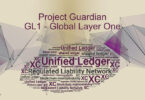Yesterday, Dubai’s Department of Economic Development (Dubai Economy), along with six banks, established a blockchain consortium for sharing verified know your customer (KYC) company data between banks and licensing authorities in the UAE.
The participants in the ‘KYC Blockchain Consortium’ include Emirates NBD, Emirates Islamic, HSBC, RAKBANK, Abu Dhabi Commercial Bank (ADCB), and Commercial Bank of Dubai (CBD). It aims to enable a faster, onboarding for company bank accounts to bolster business in the country.
“The platform will offer a digital ‘Instant Bank Account’ functionality, allowing for faster and less cumbersome onboarding journey with banks and significantly improving the experience of new investors looking to establish themselves in the UAE. This, in turn, will boost customer satisfaction as well as ease of doing business in the UAE as a whole,” said Ali Ibrahim, Deputy Director-General of Dubai Economy.
The platform will launch in the first quarter of 2020, after which other organizations can join the initiative. The Consortium will work on the mutualization of KYC efforts between the current and future participants. Smart Dubai, in collaboration with the UAE Central Bank, will oversee the Consortium operations.
“The concept of a Blockchain-based KYC platform will optimize costs by enabling financial and banking institutions to deviate from the outdated process of identification verification and take full advantage of today’s blockchain technology that has the potential to be faster, easier, safer and more efficient than the traditional verification processes,” said Geoff Stecyk, COO of RAKBANK.
One question often arises with shared KYC. What if one bank relies on the data from another, and it turns out the data is wrong? In Australia, the law is being changed to limit liability, provided the recipient performs due diligence on the data provider’s KYC processes.
Our understanding is that currently the responsibility in the UAE is with the bank that uses the KYC. The consortium’s technology partner Norbloc told Ledger Insights that there is already a precedent in outsourcing client data validation to the big accounting consultancies, and that’s covered by contracts. When receiving the KYC data it’s up to the banks how much they choose to rely on it. But even if they spend 30% less time on validation that’s a major saving.
“The customers is always the winner as he does not need to collect and provide the same information twice,” norbloc CEO and co-founder Astyanax Kanakakis told Ledger Insights via email.
Norbloc’s Fides KYC Platform allows users to onboard institutions using digital workflows with APIs to public data sources such as company registries, electronic ID platform, and other systems. Additionally, the platform allows banks to monetize their validation by collecting a fee every time another company uses it to review a customer.
The blockchain simply stores a pointer to the data, and the underlying data is communicated between the parties using the norbloc P2P protocol. The ledger is Hyperledger Fabric, but it has been tested with Ethereum and R3’s Corda.
In terms of blockchain infrastructure, data platform Dubai Pulse, a joint initiative of Smart Dubai and telecoms firm du, will act as the government-certified blockchain platform enabler. du offers a Blockchain Platform as a Service (BPaaS), to enable government entities to build a framework based on their needs.
Last year, Ledger Insights reported on the Dubai International Financial Centre (DIFC) blockchain KYC solution with Mashreq Bank and norbloc. This is a separate initiative. “The project builds on our other efforts in this market, such as the shared KYC Blockchain initiative launched by Mashreq Bank and licensing authority Dubai International Financial Center (DIFC) in July 2019, also built on Fides,” said Kanakakis. “We believe the formation of this Consortium lays the foundation for a nationwide, unified ecosystem for sharing of enhanced and validated KYC data.”
Dubai, as well as the rest of the UAE, has been actively exploring blockchain applications. Emirates NBD is in a partnership with the Dubai Chamber of Commerce for blockchain trade finance. The Chamber is also working with the International Chamber of Commerce (ICC) and blockchain startup Perlin to offer trade finance solutions in the region.
Meanwhile, Dubai Economy previously launched a company registration blockchain and worked with Dubai Pulse to host the registry platform.
Update: the article was amended to add the legal situation in the UAE and the technology used by norbloc.






